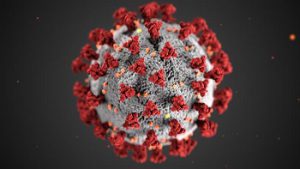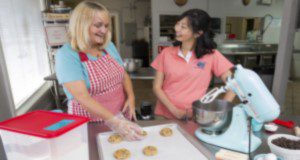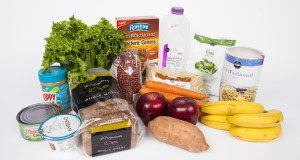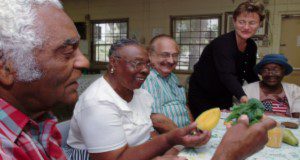This is the Mandarin Chinese translation of FSHN20-18/FS341, COVID-19 and Food Safety FAQ: Is Coronavirus a Food Safety Issue? It provides guidance related to COVID-19 regarding food production, handling, and packaging. Written by Natalie Seymour, Mary Yavelak, Candice Christian, and Ben Chapman, and published by the UF/IFAS Food Science and Human Nutrition Department.
https://edis.ifas.ufl.edu/fs387
Tag: Food Science and Human Nutrition Department
COVID-19 and Food Safety FAQ: Is Coronavirus a Concern with Takeout? (Mandarin Chinese)
This is the Mandarin Chinese translation of FSHN20-22/FS349, COVID-19 and Food Safety FAQ: Is Coronavirus a Concern with Takeout? It provides answers to frequently asked questions regarding COVID-19 and takeout food. Written by Natalie Seymour, Mary Yavelak, Candice Christian, and Ben Chapman, and published by the UF/IFAS Food Science and Human Nutrition Department.
https://edis.ifas.ufl.edu/fs388
COVID-19 Preventative Measures: What to Do If You Are Sick (Mandarin Chinese)
This is the Mandarin Chinese translation of FSHN20-17/FS340, COVID-19 Preventative Measures: What to Do If You Are Sick. It provides guidance for seeking medical attention, staying away from others, and avoiding infecting others. Written by Natalie Seymour, Mary Yavelak, Candice Christian, and Ben Chapman, and published by the UF/IFAS Food Science and Human Nutrition Department.
https://edis.ifas.ufl.edu/fs386
Finding and Using a Co-Packer
A contract packager, commonly called a co-packer, is a manufacturer that will produce, package, and/or label a product for clients. This new 7-page factsheet provides a brief overview on the definition of co-packers, advantages and disadvantages of using a co-packer, and the list of things you need to consider when you hire and work with a co-packer. It also includes a noncomprehensive list of co-packers in Florida and Georgia. This factsheet is one in the Food Entrepreneurship in Florida series, which serves as a useful guide to help run a successful food-related business. Written by Alison O’Donoughue, Wendi Jennings, and Soohyoun Ahn, and published by the UF/IFAS Food Science and Human Nutrition Department.
https://edis.ifas.ufl.edu/fs380
Jere COVID-19: Pwodwi jaden ak izin anbalaj yo
Pandan ke pa gen prèv ki asosye viris COVID-19 la a yon pwoblèm sekirite alimantè, li se yon pwoblèm sante pou travayè yo paske li pwopaje l pa kontak moun ak moun oswa lè w manyen yon sifas ki kontamine. Manje pa parèt tankou yon kòz ki favorize transmisyon COVID-19 la, men menm pratik yo itilize pou evite maladi ou ka pran nan manje, menm pratik sa yo ta dwe itilize pou diminye chans kontaminasyon COVID-19 la nan nan pwodwi alimentè ki fre yo epi risk pou COVID-19 ta simaye l pami travayè agrikòl yo ak sa kap travay nan izin anbalaj yo.
This new 2-page publication of the UF/IFAS Food Science and Human Nutrition Department is the Haitian Creole translation of FSHN20-25, Handling COVID-19: Produce Farms and Packinghouses. Written by Laurel Dunn (UGA) and translated by Emmanuel Duvalsaint.
https://edis.ifas.ufl.edu/fs385
Etalaj fwi, legim ak lòt pwodwi agrikòl nan peryòd COVID-19: kisa machann yo ka fè pou pwoteje tèt yo ok kliyan yo
Agrikiltè ak kliyan yo pa dwe ale kote yo etale fwi, legim ak lòt pwodwi agrikòl pou vann si yo gen sentòm COVID-19 la, oswa si yo ta antre an kontak ak yon moun ki malad. Nenpòt moun ki ta gen sentòm yo ap kite espas sa a.
This new 2-page publication of the UF/IFAS Food Science and Human Nutrition Department is the Haitian Creole translation of FSHN20-28, COVID-19 and Farm Stands: Steps for Farm Stand Operators. Written by Natalie Seymour, Mary Yavelak, Candice Christian, and Ben Chapman (all of NCSU) and translated by Emmanuel Duvalsaint.
https://edis.ifas.ufl.edu/fs384
Sekirite alimante ak COVID-19 : Kesyon yo poze souvan : Eske kowona viris se yon pwoblem nan pwodiksyon fwi ak legim
Nan moman sa a, CDC, FDA ak USDA pa rapòte okenn ka maladi ki ta sigjere kowona viris la ka transmèt sòti nan manje oswa nan anbalaj pwodwi alimantè. Rechèch ki fèt sou viris ki menm jan an tankou SARS ak grip montre risk transmisyon viris la pou l ta sòti nan yon manje fèb anpil. Pandan ke pa gen anpil enfòmasyon sou ki kantite tan viris la ka fè sou yon sifas, risk pou transmisyon an ta sòti nan yon manje fèb epi li pa ta dwe enkyete nou.
This new 2-page publication of the UF/IFAS Food Science and Human Nutrition Department is the Haitian Creole translation of FSHN20-23, COVID-19 and Food Safety FAQ: Is Coronavirus an Issue in Produce Production?. Written by Natalie Seymour, Mary Yavelak, Candice Christian, and Ben Chapman (all of NCSU) and translated by Emmanuel Duvalsaint.
https://edis.ifas.ufl.edu/fs383
COVID-19 mezi prevantif: mas an twal pou anplwaye ki nan sekte alimante
Daprè CDC, yon metòd efikas pou kwape pwopagasyon maladi enfektye sa a se lè w kouvri visaj ou ak yon twal oswa w mete yon mas an twal. Yo itilize mas an twal yo pou kouvri bouch ak nen yon moun ki enfekte oswa ki ta ka enfekte si l pran viris la lè yon moun ap touse, estènen oswa nan yon konvèsasyon nòmal. Mas an twal yo bay bon jan pwoteksyon si yo 1) bon kalite 2) mete yo byen 3) sèvi ak yo byen. Lè w mete yon mas an twal, li ka diminye ris men li pa bay yon pwoteksyon total kapital. Nou dwe swiv lòt metòd pou diminye ris yo tankou: pa rete pre yonn ak lòt, lave men nou, itilize sanitzè/dezenfektan pou men epi evite manyen je w, nen w ak bouch ou.
This new 2-page publication of the UF/IFAS Food Science and Human Nutrition Department is the Haitian Creole translation of FSHN20-33, COVID-19 Preventative Measures: Cloth Face Coverings for Food Employees. Written by Natalie Seymour, Mary Yavelak, Candice Christian, and Ben Chapman (all of NCSU) and translated by Emmanuel Duvalsaint.
https://edis.ifas.ufl.edu/fs382
Jere COVID-19 : Pi bon Pratik pou Agribiznis
COVID-19 simaye l sitou pa kontak dirèk moun ak moun, oswa si pandan yon moun ap touse oubyen pale postiyon krache a ki deja gen viris la kontamine yon sifas epi yon moun ki ansante manyen kote sa a. Pandan ke pifò magazen manje ak ekipman kontinye fonksyone pandan maladi a ap simaye ak lòt ijans, kèk mezi prevantif ka pran pou pwoteje sante anplwaye yo ak kliyan yo.
This new 2-page publication of the UF/IFAS Food Science and Human Nutrition Department is the Haitian Creole translation of FSHN20-27, Handling COVID-19: Best Practices for Agribusiness. Written by Tom Maddox and Laurel Dunn (both of the University of Georgia) and translated by Emmanuel Duvalsaint.
https://edis.ifas.ufl.edu/fs381
Planificacion de comidas para la diabetes: manejo de la ingesta de carbohidratos
Mantener una ingesta constante de carbohidratos durante todo el día es un método eficaz de planificación de comidas para ayudar a mantener su objetivo de niveles de glucosa en sangre. Los alimentos que contienen carbohidratos tienen el mayor efecto sobre los niveles de glucosa en sangre en comparación con los alimentos que contienen principalmente proteínas o grasas. Los carbohidratos en los alimentos que contribuyen a la glucosa en la sangre incluyen azúcares y almidones. Los alimentos que contienen carbohidratos se dividen en grupos según su similar contenido de carbohidratos por porción. La cantidad de carbohidratos que consuma se basa en sus objetivos de tratamiento de la diabetes y la tolerancia a los carbohidratos.
This new 2-page article is the Spanish translation of FSHN20-1/FS324, Diabetes Meal Planning: Managing Your Carbohydrate Intake, written by Nancy J. Gal and Wendy J. Dahl, translated by Daniela Rivero Mendoza, and published by the UF/IFAS Food Science and Human Nutrition Department.
https://edis.ifas.ufl.edu/fs377
Planificacion de menu para adultos con diabetes
La nutrición, la actividad física y la medicación son los tres componentes principales de un plan de manejo de la diabetes. Según la Asociación Americana de Diabetes, no existe un plan específico de comidas para la diabetes. Si tiene diabetes, es importante desempeñar un papel activo en su autocontrol diario. Al trabajar con un Dietista Nutricionista Registrado (RDN), preferiblemente uno que sea un educador certificado en diabetes (CDE), puede desarrollar un plan de nutrición personalizado basado en sus objetivos de tratamiento, medicamentos y preferencias personales.
This new 2-page article is a translation of FSHN19-3/FS323, Meal Planning for Adults with Diabetes, written by Nancy J. Gal and Wendy J. Dahl, translated by Daniela Rivero Mendoza, and published by the UF/IFAS Food Science and Human Nutrition Department.
https://edis.ifas.ufl.edu/fs376
COVID-19 Preventative Measures: Facemasks and Cloth Face Coverings
These five new flyers in the COVID-19 Preventative Measures series, written by Natalie Seymour, Mary Yavelak, Candice Christian, and Ben Chapman of NC State University, provide guidance on the benefits and proper use of facemasks and cloth face coverings in nonmedical settings, including for food employees. Published by the UF/IFAS Food Science and Human Nutrition Department.
https://edis.ifas.ufl.edu/fs371
https://edis.ifas.ufl.edu/fs372
https://edis.ifas.ufl.edu/fs373
https://edis.ifas.ufl.edu/fs374
https://edis.ifas.ufl.edu/fs375
COVID-19 and Farm Stands: Steps for Farm Stand Operators
This new flyer, written by Natalie Seymour, Mary Yavelak, Candice Christian, and Ben Chapman (NCSU) and published by the UF/IFAS Food Science and Human Nutrition Department, provides information on best practices, communication with customers, and cleaning and disinfection for farm stand operators. The original version of this flyer was published at https://foodsafety.ces.ncsu.edu/covid-19-resources/.
https://edis.ifas.ufl.edu/fs370
Handling COVID-19: Best Practices for Agribusiness
COVID-19 is spread primarily via close person-to-person contact, or when virus-containing droplets expelled during coughing or talking contaminate a surface that is later touched by a healthy individual. While most feed and supply stores continue to operate during disease outbreaks and other emergencies, preventive steps can be taken to protect the health of employees and customers. The original version of this flyer was published at https://foodsafety.ces.ncsu.edu/covid-19-resources/. Written by Tom Maddox and Laurel Dunn (University of Georgia) and published by the UF/IFAS Food Science and Human Nutrition Department.
https://edis.ifas.ufl.edu/fs369
Handling COVID-19: Produce Farms and Packinghouses
While there is no evidence that the COVID-19 virus is a food safety concern, it is a worker health concern because it spreads via close person-to-person contact or by contact with contaminated surfaces. Food does not appear to be a likely cause of COVID-19 transmission, but many of the same practices used to prevent foodborne illness on foods should still be used to reduce the likelihood of COVID-19 contamination on fresh produce and the risk of COVID-19 spread among farm and packinghouse workers. This material is adapted from the version published at https://foodsafety.ces.ncsu.edu/covid-19-resources/. Written by Laurel Dunn and published by the UF/IFAS Food Science and Human Nutrition Department; 2 pages.
https://edis.ifas.ufl.edu/fs366
Preguntas Frecuentes del COVID-19 para Fincas “U-PICK”: Instrucciones para Gerentes de Fincas
*Buenas practicas
*Comunicación con los clientes
*Limpieza y desinfeccion
*La buena noticia
This new two-page article is the Spanish-language translation of FSHN20-15/FS338, COVID-19 FAQ for U-Pick Farms: Steps for Farm Managers.Written by Natalie Seymour, Mary Yavelak, Candice Christian, and Ben Chapman, translated by Fernando Alferez, and published by the UF/IFAS Food Science and Human Nutrition Department.
https://edis.ifas.ufl.edu/fs358
Preguntas frecuentes sobre el COVID-19 para los mercados agrícolas: Instrucciones para los mercados y administradores de mercados
*Las mejores prácticas
*Comunicación
*Limpieza y desinfección
*Las buenas noticias
This new two-page document is a Spanish-language translation of FSHN20-03/FS326: COVID-19 FAQ for Farmers Markets: Steps for Markets and Market Managers. Written by Natalie Seymour, Mary Yavelak, Candice Christian, and Ben Chapman, translated by Cesar Asuaje, and published by the UF/IFAS Food Science and Human Nutrition Department.
https://edis.ifas.ufl.edu/fs362
COVID-19 and Food Safety FAQ: Shopping and Handling Groceries
This new one-page flyer answers food safety questions about preventing COVID-19 transmission when grocery shopping and handling groceries. Written by Natalie Seymour, Mary Yavelak, Candice Christian, and Ben Chapman (NC State University Extension) and published by the UF/IFAS Food Science and Human Nutrition Department.
https://edis.ifas.ufl.edu/fs367
COVID-19: Seguridad de Alimentos: Me debo preocupar del coronavirus cuando voy al supermarcado?
¿Me debo preocupar del coronavirus cuando voy al supermercado?
¿Me pudiera enfermar con el COVID-19 si toco alimentos o paquetes que han estado en contacto con este virus?
¿Cómo debo manipular las frutas y verduras?
¿Qué pasos puedo tomar para disminuir el riesgo de contaminación cuando voy al supermercado?
¿Qué está haciendo mi tienda para minimizar mi riesgo?
This is a Spanish language version of FSHN20-20/FS348, COVID-19 and Food Safety FAQ: Is Coronavirus a Concern at Grocery Stores?, written by Natalie Seymour, Mary Yavelak, Candice Christian, and Ben Chapman (NC State University Extension), and published by the UF/IFAS Food Science and Human Nutrition Department.
https://edis.ifas.ufl.edu/fs365
COVID-19 seguridad de alimentos: Me debo preocupar del coronavirus y la comida para llevar?
¿Me debo preocupar del coronavirus y la comida para llevar?
¿Cuáles son los riesgos con las comida para llevar o de autoservicio?
¿Qué riesgos hay con los alimentos entregados a domicilio?
¿Pudiera contagiarme con el COVID-19 si toco comida o paquetes expuestos al virus?
¿Qué pasa dentro de mi cuerpo si ingiero el coronavirus a través de alimentos?
This is the Spanish language version of FSHN20-21/FS349: COVID-19 and Food Safety FAQ: Is Coronavirus a Concern with Takeout?, written by Natalie Seymour, Mary Yavelak, Candice Christian, and Ben Chapman (NC State University Extension), and published by the UF/IFAS Food Science and Human Nutrition Department.
https://edis.ifas.ufl.edu/fs364




